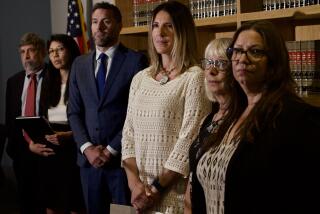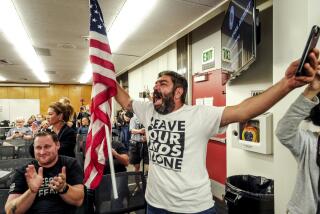Emotional Welcome for AIDS Teacher : Tears, Hugs Mark Return to School
- Share via
Vincent Chalk, teacher, AIDS patient and reluctant crusader, came back to work Monday.
He looked tan and fit, sharply dressed in subtle shades of beige. His smile came easily and often. He hugged a lot of students. His eyes watered more than once.
But the occasion of Chalk’s return to Irvine’s University High School following last week’s appellate court decision was not entirely joyous. He was welcomed back as a missing loved one, one facing a death sentence.
He will work, he said, “as long as I can.”
‘Positive Attitude’
“It’s just my intent to stay as healthy as possible, to have a positive mental attitude,” he said.
The decision by the U.S. 9th Circuit Court of Appeals in San Francisco allows Chalk, 43, to resume his duties as regional occupational program coordinator for deaf students at University High and Venado Middle School. He will do so part time, depending on how he feels.
“All you can do is listen to your body,” he said.
But Chalk, as usual, seemed uncomfortable talking publicly about his private struggle with acquired immune deficiency syndrome. At a news conference before school Monday, television cameras, including one manned by a University High assistant principal, bore down on him as he attempted to explain in “quotable” snippets of emotion how it felt to be back, how it felt to have a fatal disease, how it felt to work with students who cared so much about him.
Chalk said that he was happy to be back, that he felt fine, that he slept well Sunday night and that he enjoys working with deaf kids, whom he has found to be funny, very open and unjaded by the usual temptations that beguile Southern California teen-agers.
He acknowledged that “one or two” parents were uneasy with the idea of his return. “We are working with those parents,” he said. “I pose no threat. If they don’t want to have contact with me, they have that choice.”
But those parents remained unnamed and elusive. At school Monday, the only demonstrations were those of support, in the form of welcoming songs and banners, and homemade gifts.
Paula Wirth Morrow, whose daughter, Sunshine, is one of Chalk’s students at Venado Middle School, said in a telephone interview, “I told my daughter, ‘When you see Mr. Chalk make sure that you go up and give him a big hug.’ ”
At the news conference, several of Chalk’s students did just that. They told him in sign language how happy they were to have him back. One handed him a plant with red blossoms. She had grown it herself.
Touched by the emotional display, Chalk told them all how he, too, was happy to have them back. He would talk to them later, he said pointing to the sea of cameras, when they weren’t around.
The students smiled and nodded.
‘He’s Very Special’
“He’s like a father to me,” said one of them, Monica Saldana, through an interpreter. “He’s very special. I just can’t explain it.”
Although he officially resumed work at the school Monday, meetings were expected to take up most of the teacher’s time during this Thanksgiving holiday week. So students approached him whenever they could--as he stood outside talking to a reporter, and during a lull between meetings at the school’s administration office.
“How are you feeling?” junior Eduardo Romero asked Chalk in sign language. “Fine,” came his teacher’s response, a smile gliding over his face. Eduardo looked pretty grown up, Chalk said, as he sized up the student’s mustache, slicked back pompadour and denim jacket, its collar standing up in the back.
“And you!” Chalk exclaimed to senior Eric Bartley. “Each time I see you, it’s whew!” Chalk said, apparently referring to Eric’s impressive muscle tone. The temperature was in the low 50s outside, but Eric came to school dressed in two tank tops that showcased his rippling biceps.
Most of the 100 or so students in the school’s program for the hearing impaired haven’t seen Chalk since February, when he was hospitalized for Pneumocystis carinii pneumonia, a common infection in AIDS patients.
He was ill for most of last winter, dropping about 30 pounds in a few weeks. He recovered, but not before discussing his illness with his immediate supervisor, Carolyn Rowland, principal of the hearing impaired students.
Barred From Classroom
They decided to inform district authorities. As a consequence, Chalk was barred from the classroom. Since the school year began in September, he has been assigned a desk job at the Orange County Department of Education in Costa Mesa, pending a court decision.
The department filed a suit against Chalk in August, asking the court’s opinion on whether he should be allowed near students. The case later was transferred to federal court in Los Angeles, where Chalk filed his own suit to regain his teaching position. U.S. District Judge William P. Gray sided with the Education Department in barring Chalk from the classroom. Wednesday’s appeals court decision overturned Gray’s order. It also made him the first AIDS patient to win an appellate court decision protecting his right to work.
Several issues in the case remain unresolved, including attorney’s fees and damages. Robert Peterson, Orange County superintendent of schools, said that before settling with Chalk he wanted to review the full written decision of the appellate judges.
“If we had it to do over again, we wouldn’t do anything differently,” said Rowland of the decision to inform district officials of Chalk’s AIDS. “We thought at the time about who has the right to know, the parents, the students, the school, and about Vince’s confidentiality.
“Now that a decision has been made, I think it will be a guide to other employers,” she said.
But with his all-consuming legal battle behind him--the Education Department said it will not appeal--Chalk turned his attention to the delicate matter of facing his own mortality and sharing that with his students.
Several parents of Chalk’s students said they already have begun discussing with their children what it could mean to grieve for their teacher’s death.
‘It’s So Sad’
“I would rather know (that he is going to die) than to have yet another shock,” said Rona Lev, 13, a freshman at University High who has worked with Chalk for three years. “I can relish the moments that I have with him. It’s so sad. He is so good, and it is so painful to (think) that he will be dead in two years.” (Many AIDS patients die within two to three years of diagnosis.)
Erika Gold, 13, added through her interpreter and mother, Lynn Dickson Gold, “I think the students would like to see him happy before he dies, and that means teaching.”
Chalk, too, said he has thought extensively about the issue and has begun discussing with his principal the best ways to approach it.
“The county is concerned with how much kids are told,” Chalk said. “About how much I tell them about me, the disease and how it is spread. They are concerned that too much is going to be said and that the kids are not ready for it.”
But Chalk, who is gay, said it was difficult to put limits on such a discussion, especially when emotions concerning his return are so raw.
“This has been basically a forced separation,” he said of his time away from his students. “It’s like a child and a parent who have been separated. It’s emotional. Their feelings are very out there. They worry about me, my physical health. If, in the time that I have left, I can spend some time with them, that will make my peace of mind better.”
More to Read
Sign up for Essential California
The most important California stories and recommendations in your inbox every morning.
You may occasionally receive promotional content from the Los Angeles Times.










